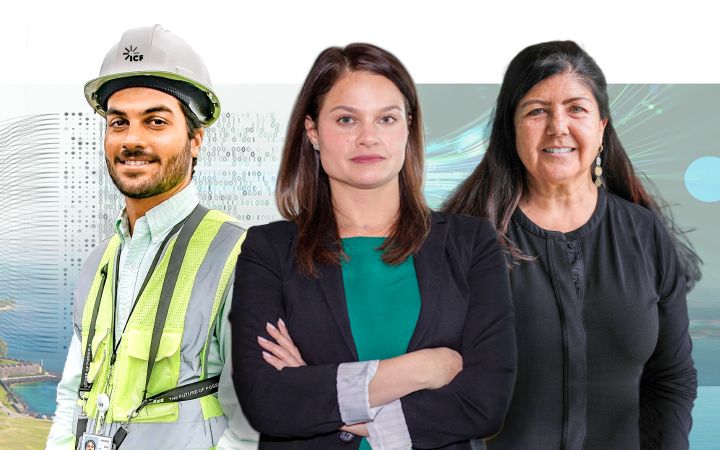How we diversify our views of abilities at ICF
The Americans with Disabilities Act 1990 and Rehabilitation Act of 1973, celebrating it's 50th anniversary in 2023, have provided important protections for people with diverse abilities for decades. And we’re reflecting on how this and other important laws have paved the way for more acceptance in the workplace, created access to resources and education, and opened the door to more employment opportunities. We recently caught up with the co-leaders of our internal affinity group for employees with diverse abilities: Julia Schaeman, senior research scientist, and Jessica Steinberg, senior director of talent marketing.
Q: Can you start by telling us a little bit about ICF’s diverse abilities affinity group and why it’s so important?
Jessica: Our Diverse Abilities Employee Community Network is a voluntary, employee-led resource group to meet, share stories, and give or find support to those who have diverse abilities. It can be challenging to navigate having a diagnosis or diverse ability at work. What do you share? How do you get support? Will being open about your abilities limit your job opportunities? Many people came together to pave the way to create the protections and rights that so many of us enjoy. But there is more work to do to empower our employees with answers to these questions.
People in the diverse abilities community may be disproportionately affected by medical bills, the need to navigate internal company policies, or challenged to find medical or mental health resources during a crisis. We aim to bring the experts to them and anyone who may benefit from learning about available support.
Julia: As a child, my parents advocated for me and taught me that persistence is necessary when navigating education, accommodations, and the real world. As an adult in my earlier work career, this helped me find the support I needed to ensure my success in the workplace, but it wasn’t always a straightforward path. I want to help others navigate their own paths.
Today there is more focus on diversity, equity, and inclusion, and I’ve become more comfortable in showing myself, instead of hiding. I’ll show my cochlear implants on camera, acknowledge when I have missed something someone says on a work call, and ask additional questions when the accommodations process isn’t as clear.
“Earlier in my career, I often took leave without pay or made other detrimental choices to avoid drawing attention to my own health issues. Now I’m motivated to safely bring conversations about diverse abilities out of the shadows for others.”
- Visit Job Accommodation Network where you can find an A-to-Z list of disabilities, accommodations, and related topics.
- Accommodation requests start with your doctor. You can also ask for recommendations and suggestions based on their experience.
- Find support and resource groups on social media and other forums where people have already come together to share information about their diverse abilities.
Q: What would you say to someone with diverse abilities who’s navigating the working world? How should they advocate for themselves? What resources should they seek?
Julia: If you’re new to ICF and bring diverse abilities to our team, let me first say, “Welcome!” Generally speaking, for anyone in the working world, it can be hard to come to the table with diverse abilities, which is why it’s so important to be proactive. Start advocating for your needs by doing some initial research to have background and supporting details to draw from. Then bring what you’ve gathered to the attention of your company advocates. At ICF, that means meeting with HR to discuss your needs and next steps. It’s up to you to decide if you want to disclose your diverse abilities with your supervisor, but either way, you can trust your HR partner to work towards a solution.
Q: How can people managers and colleagues become better informed about their roles in supporting employees with disabilities?
Julia: I often ask our people managers and fellow colleagues to explore the diversity, equity, and inclusion training available to ICF employees—and to continually check in with their employees to offer support. I also encourage participation in our affinity group events. Last year, we held a meeting about the accommodations process and what steps employees need to take to start advocating for themselves—but really, anyone can benefit from learning about this.
Q: What are your thoughts on using the phrase “diverse abilities” versus “disabilities”?
Julia: In expressing this community as being “diversely abled,” we do not hide ourselves. Instead, we claim our unique abilities for ourselves, recognize that our unique perspectives are an asset, and demonstrate that these diverse abilities may make our lives more challenging, but ultimately, they also make us stronger.
Jessica: Diverse abilities is a welcoming term for anyone who has a diagnosis they must navigate. While technically, these may be protected classes of medical disabilities, some people may identify as disabled; others do not. Some have diverse abilities they’ve had to overcome from birth; others may be facing something new. And anyone can have a connection as a family member, caregiver, co-worker, or friend…anyone who feels an affinity for this community is welcome.
